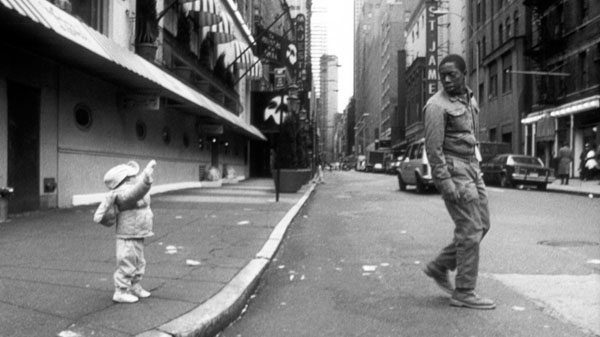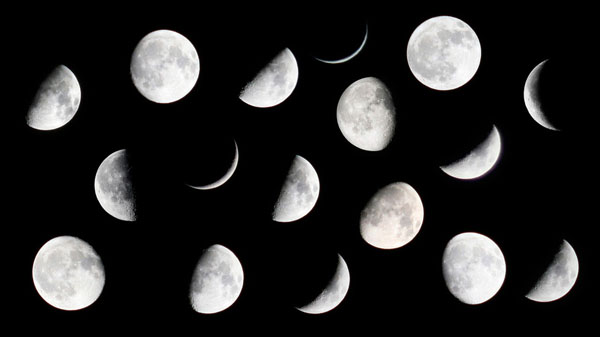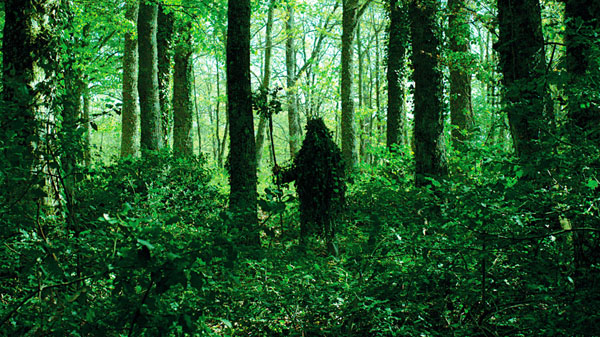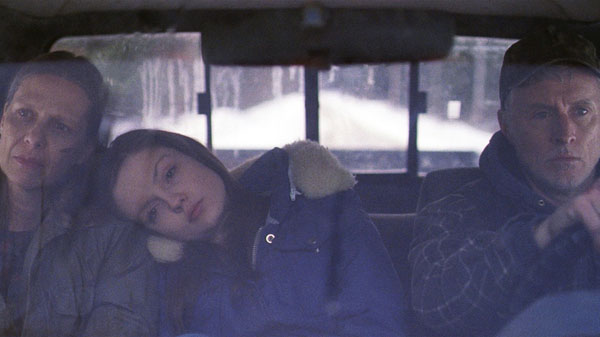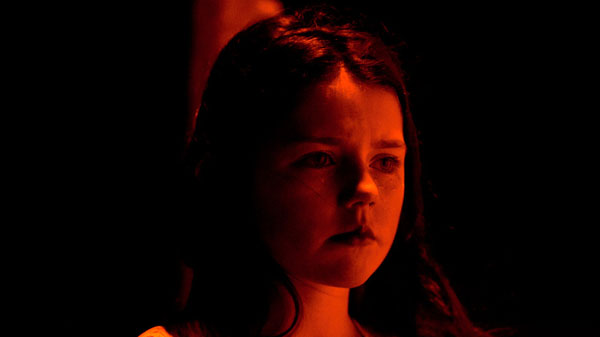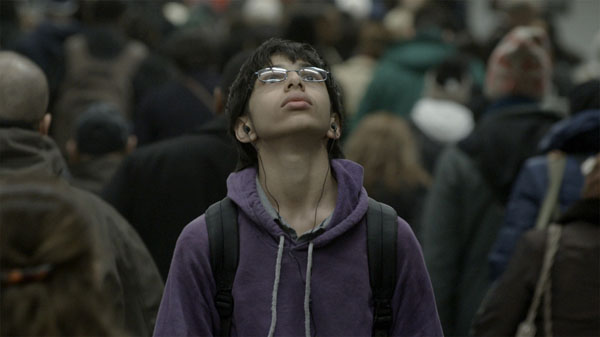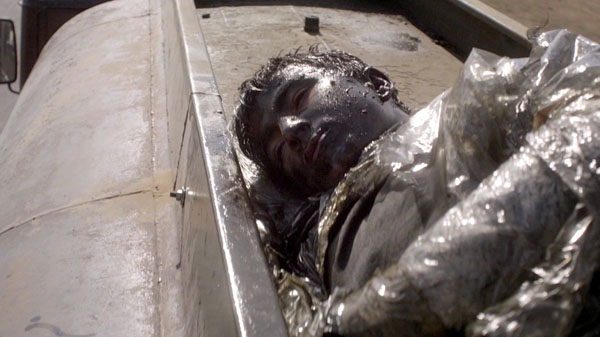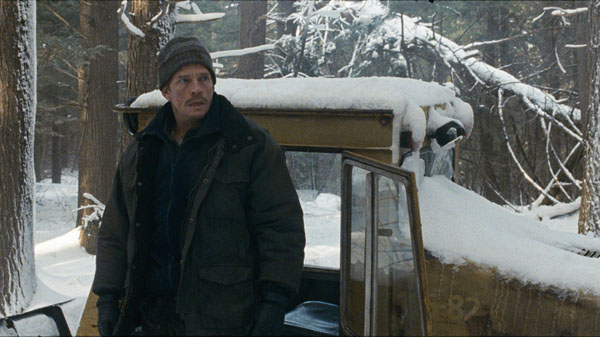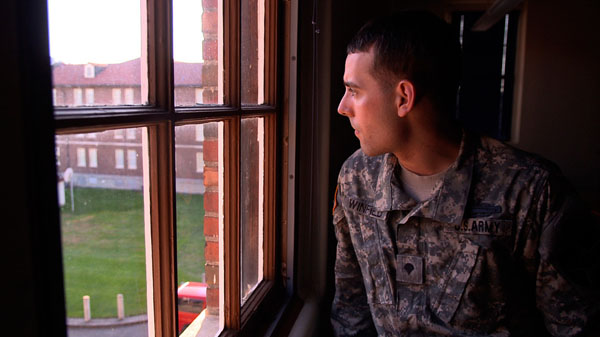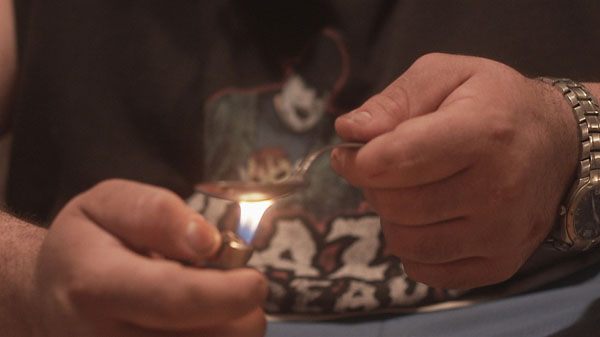We’ll be gathering highlights from notable reviews of notable films throughout the run of this year’s Tribeca Film Festival, the 12th, running from today through April 28.
“This year’s opening-night film, Tom Berninger’s Mistaken for Strangers, is not the usual blaze of Hollywood glamour but a documentary that follows a Brooklyn indie rock band, the National, on tour,” writes Stephen Holden. “The choice of a rock ‘n’ roll documentary to begin the festival is a sign that Tribeca, which barged into New York on a mission of community redevelopment after Sept. 11 emptied Lower Manhattan, has resolved its identity crisis. Like a gawky, loudmouth kid who has matured into a poised adolescent, it has nothing left to prove. The festival, which I’ve covered since its inception in 2002, peaked in size in 2006. Since then it has shrunk, become more artistically discriminating and has snugly woven itself into the city’s cultural fabric; it’s aware that it doesn’t have to be the biggest and the best, it only has to be good.”
Also in the New York Times, John Anderson talks with the programmers behind Storyscapes, “the festival’s foray into transmedia: the crazy-quilt crossroads of new technology, uncertain expectations and audience participation.” And Dave Itzkoff reports that the festival’s introducing a new award this year: “The Nora Ephron Prize will be given annually to ‘a woman writer or director with a distinctive voice who embodies the spirit and vision of the legendary filmmaker and writer.'”
For Film International, Gary M. Kramer talks with curator Jon Gartenberg about putting together Let There Be Light: The Cycle of Life, a program of 13 experimental short films from around the world. What’s “very important” to Gartenberg is that “this program is within the context of the other shorts programs—it’s not its own sidebar.”
“The grisly, perverse, and otherwise edgy thrills of the Tribeca Film Festival’s ‘midnight‘ section begin this year with Thursday’s world premiere of Dark Touch, a brooding chiller about children in rural Ireland who are haunted by abuse.” Aaron Hillis previews the program for the Voice.
“Part of the fun of Tribeca has always been wading through this mass of cinema in hopes of making some fresh discoveries,” writes Andrew Schenker at the top of the special section where Slant will be posting daily reviews.
New York‘s David Edelstein, Bilge Ebiri, and Miranda Siegel argue that Tribeca’s “become an absolutely indispensable venue for some of the best in documentary filmmaking, as well as terrific, beneath-the-radar international narrative features.” And they list 18 to catch.
More recommendations: Complex (15 titles), David D’Arcy (Thompson on Hollywood, 7), David Ehrlich (Film.com, 20), Gothamist (ten, plus a few special events), Jason Guerrasio (Movies.com, 15), Indiewire (20), the L (6), Jeff Labrecque (EW, 13), Scott Macaulay (Filmmaker, 25), Andrew O’Hehir (Salon, 10), the Playlist (20), Lily Rothman (Time, 10), Time Out New York (ten), Twitch (17), and Stephanie Zacharek (10), who writes in the Voice: “This is the second year of the tenure of Artistic Director Frédéric Boyer, formerly programmer of Cannes’s Directors Fortnight sidebar, and the mix—more than 100 films—appears to be broadening and deepening.”
Updates, 4/20: “Propellers where faces ought to be. Woman-on-woman death matches. Celebrity chefs with a taste for human flesh.” For the NYT, Neil Genzlinger surveys the midnight movies.
“While Tom Berninger’s Mistaken for Strangers is technically rooted in the travels of successful indie rock band The National, it would be inaccurate to characterize it as a rock documentary,” writes Indiewire‘s Eric Kohn. “Berninger, brother of The National frontman Matt, hardly emphasizes the history of the band’s rise or its artistry. Instead, he focuses on himself and the tensions he has shared with his sibling, nine years his senior, since childhood. The younger Berninger, a bearded, portly jokester, seemingly can’t get enough of his own pathetic state. The result is a witty, rumpled story about a witty, rumpled black sheep that never reaches beyond the average aspirations of its goofball star.”
“Tom proves to be a riotous force among the group—constantly attempting to infuse situations with fun and frivolity, carrying his video camera with him everywhere, often refusing to turn it off when asked,” writes Katie Calautti at Movies.com. “Tom is flawed and raw and silly and shockingly frank. His access is unprecedented, but he’s dually unimpressed—it makes for some really incredible interviews.”
“At the Highline performance [on Tribeca’s opening night], I asked Tom whether he intended from the start to make a film about sibling dynamics and its fraught-but-still-heartwarming ways,” reports the Los Angeles Times‘ Steven Zeitchik. “‘No,’ he said, laughing. ‘No, no, no,’ then laughed more. Still, this piece of anti-documentary may have gotten there anyway. Across the club from Tom at that moment, Matt Berninger was greeting well-wishers, telling them that in the theater he’d found himself crying by the end of the movie.”
More from John DeFore (Hollywood Reporter), Ronnie Scheib (Variety), and Gabe Toro (Playlist, A-).
For the NYT, Mike Hale heads to “PS1 in Queens, site of Alberi, an installation by the celebrated Italian artist and filmmaker Michelangelo Frammartino,” whose “feature-length Quattro Volte was a critics’ favorite in 2011—my colleague A.O. Scott called it ‘idiosyncratic and amazing’—and the 25-minute Alberi (it means trees in Italian) bears a strong family resemblance to the earlier film. It is free of dialogue but full of sound, and the VW Dome at PS1 wraps the viewer in wind, footsteps, rustling leaves and the indistinct hum of distant human chatter. It takes place in and around a village perched in the hills of southern Italy, and it gives equal, if not preferential, billing to its nonhuman characters: trees, streams, ancient stone buildings.”
Calling Alberi “unlike anything you’ve seen before,” Indiewire‘s Eric Kohn interviews Frammartino. Updates, 5/4: Allese Thomson talks with Frammartino for Artforum. More on the project from Jesse Cataldo (House Next Door) and Steve Ramos (Hyperallergic).
“Given that its chain of sorrow is set in motion by an accident involving a school bus, it’s likely that writer-director Lance Edmands’s Bluebird will draw comparison to Atom Egoyan’s The Sweet Hereafter,” writes David Rooney in the Hollywood Reporter. “But this gentle, soulfully acted drama has its own distinct identity, bringing a potent sense of place to its wintry Maine locations and a penetrating gaze to blue-collar characters in a depressed mill town. Despite threatening to overload on melancholia, the modest film maintains emotional integrity through to its final note of hope.”
“Shot by Jody Lee Lipes (Martha Marcy May Marlene), Bluebird has a beautifully stark and disquieting look full of grain, dark contrast and low-lit light that isn’t afraid to look unpretty,” notes Rodrigo Perez at the Playlist. And the score’s by Danny Bensi and Saunder Jurriaans (Simon Killer): “their simple, mildly eerie, yet effective work also adds some incredibly layered levels of mood and poignant texture.”
Stephen Saito introduces an interview with the writer-director: “Between Edmands’s familiarity with the region as well as the patience he practiced as an editor, it’s no wonder Bluebird unfolds as a series of caught moments that develop into something wholly cohesive and immersive as the film’s characters become more distant from each other, clinging onto the secrets they hold as if it’s what keeps them warm during the bitter winters, growing a bit chillier every time they’re forced to reveal one.”
And EW has a clip. Update, 5/4: More from Peter Debruge (Variety).
“Director Marina De Van has had a curious career, emerging from the shadows of collaborator François Ozon,” writes Gabe Toro at the Playlist. “Her first two films were strongly indebted to a culture of Gaellic body horror that plumbed greater depths than the more commercial sadism expressed in films like Martyrs and Inside, with her starring role in In My Skin providing stomach-turning sights as well as insightfully mapping the sadness of a person alone in her own suffering, addicted to self-mutilation. A similar prison awaited Sophie Marceau in Don’t Look Back as she found herself morphing into Monica Bellucci, a fantasy conceit with very real consequences. In some ways, her latest film Dark Touch pulls back considerably, tackling a more commercial story of a telekinetic young girl. But in others, De Van is right at home exploring the disturbed side of an identity conflict, and the way our physical experiences shape us as human beings.”
“Dark Touch is beholden to a strange internal logic that gives primacy not to its protagonist’s suffering, but to its maker’s thirst for fun,” writes Slant‘s Ed Gonzalez. “Never mind that the story perversely lacks for geographical specificity, taking place in a vaguely European, fairy tale-like hamlet where everyone speaks American English, the spectacle of Neve [Missy Keating] indiscriminately and graphically destroying everyone around her suggests Carrie‘s carnival of vengeance passed through a New French Extremity prism.”
Updates, 5/4: More from Alan Scherstuhl (Voice). And Erik Piepenburg talks with de Van for the NYT.
Updates, 4/27: The awards have been presented, so let’s have a look at what the critics are saying about the winners.
Kim Mourdant’s The Rocket has won the Founders Award for Best Narrative Feature as well as Best Actor in a Narrative Feature Film for Sitthiphon Disamoe’s performance as Ahlo. “A feel-good drama set in the impoverished mountains of Northern Laos, Kim Mordaunt’s The Rocket centers on a young boy whose village is soon to disappear thanks to construction of a massive dam downstream,” writes John DeFore in the Hollywood Reporter. Ronnie Scheib in Variety: “In a country where multinational interests are reshaping the landscape to suit their corporate needs, displaced villagers seek more familiar scapegoats to embody their misfortune—singling out, for instance, the film’s pint-size hero, Ahlo, whose scrappy determination propels the action. A kid-centric slice of intractable humanism in the mode of The Kite Runner, Tsotsi, Whale Rider or Beasts of the Southern Wild, this Rocket could launch globally.” More from Jordan Hoffman (Film.com) and Rodrigo Perez (Playlist, A-).
Sam Fleischner’s Stand Clear of the Closing Doors garners a Special Jury Mention in the World Narrative Competition. The film “updates the New Yawk New Wave favorite Little Fugitive to the days of Superstorm Sandy,” writes J. Hoberman at Artinfo. “Ricky [Jesus Sanchez-Velez], an autistic teenager from an immigrant family scraping by in Far Rockaway, takes off to ride the subway for several days even as the hurricane bears down on the defenseless city. Meanwhile, his distraught, overburdened mother [Andrea Suarez Paz] is the personification of parallel action, hopelessly searching for him…. The sub working-class, Latino milieu shades more exotic than authentic, but the cast is terrific, the movie is extremely well-shot up close and personal and, however filled with emotional hooks, Fleischner’s formalist approach is admirably uningratiating.” More from Diana Drumm (Playlist, A-) and John DeFore (THR). And Stephen Saito talks with “Fleischner, Suarez Paz and Sanchez-Velez, who could only be present for part of this conversation before getting on a plane back home, to talk about how the film came together, how the actors’ relationships to each other offscreen weren’t all that different than on it and braving the superstorm to make something special.”
Felix Van Groeningen’s The Broken Circle Breakdown, winner of an audience award in Berlin, wins Best Screenplay for a Narrative Feature Film (van Groeningen and Carl Joos) and Best Actress in a Narrative Feature Film for Veerle Baetens. “The rousing bluegrass tunes heard and performed throughout The Broken Circle Breakdown travel from soaring peaks of joy in the foot-stomping numbers to desolate valleys of sorrow in the heart-wrenching ballads,” wrote David Rooney in the Hollywood Reporter in February: “van Groeningen’s drama about a passionate relationship devastated by grief spans a comparable breadth. That makes much of it intensely moving, even if it gradually veers into the overwrought, surrendering restraint in favor of sledgehammer message-mongering.” In Variety, Boyd van Hoeij found that “sophisticated cutting brings out the story’s complex emotional undercurrents, though Breakdown’s less convincingly scripted second half sputters more often than it shines.” More from Josh Stillman at the L.
Marius Matzow Gulbrandsen wins Best Cinematography in a Narrative Feature Film for his work on Before Snowfall. “A Kurdish Iraqi village lad is obliged to avenge the family honor when his older sister runs away from an arranged marriage in Norwegian helmer Hisham Zaman’s drama Before Snowfall,” wrote Alissa Simon in Variety in February. “Weaknesses in the script and performances, as well as stodgy staging, prevent material that should ideally play as nuanced tragedy from transcending cliche.” It’s “kind of road movie,” writes Jan Landro for FIPRESCI, “but with a much clearer—and far more sombre—purpose than is common in this genre. 18-year-old Siyar is travelling through Europe in order to find and kill his sister, who has run away from her wedding in a Kurdish village and thus offended the family’s honor. The film is professionally executed, but too slow-paced.”
Emanuel Hoss-Desmarais wins Best New Narrative Director for Whitewash. A Special Jury Mention in that category goes to Emir Baigazin for Harmony Lessons. “Whitewash wastes little time setting up its story,” writes Drew Hunt in Slant. “The inciting incident happens within the opening seconds, when a man is mowed down by a bulldozer while trudging along a snowy residential street. The driver, Bruce (Thomas Haden Church), proceeds to collect the body, wrap it in a towel, and stash it in the cab before driving deep into a nearby forest to hide out…. What starts as a tense thriller eventually evolves into a darkly humorous and astute character study, a Coen brothers-esque comedy of errors by way of a Jack Londonian survival story.” Harmony Lessons, which won a Silver Bear in Berlin for Aziz Zhambakiyev’s cinematography, is “an immaculately executed study of bullying and revenge in a small town on the steppes of Kazakhstan,” wrote Leslie Felperin in Variety. “Coaxing intense perfs from a young non-pro cast and demonstrating a painterly eye with austere, digitally shot compositions, Baigazin has crafted a disturbing study in crime and punishment that evokes, among others, Kieslowski and Bresson, but still speaks in its own unique voice.”
Dan Krauss’s The Kill Team wins Best Documentary Feature. For Anthony Kaufman, writing at Sundance Now, it “hits all the right buttons: political injustice, moral outrage, and emotional catharsis. The film goes behind the scenes of the infamous ‘Kill Team,’ members of a U.S. Army infantry platoon who were arrested and convicted for killing innocent civilians in Afghanistan. The focal point of the story becomes the case of private Adam Winfield, a whistleblower who may have been a willing participant in the murders. Structuring the film around Winfield’s trial in a U.S. military court, Krauss raises concerns about the fairness of a case being mounted by those who have a vested interest in how the results will reflect back on the Army. Is Winfield a scapegoat or a killer? What makes The Kill Team more than just another story of U.S. military iniquity is that the answer is probably both.” More from Joel Arnold (NPR), Ronnie Scheib (Variety), and Gabe Toro (Playlist, A).
Sean Dunne wins Best New Documentary Director and Oxyana scores a Special Jury Mention. It’s “a poignant and often difficult-to-watch portrait of the devastation Oxycontin has wrought in certain swaths of Appalachia,” writes Brandon Harris for Filmmaker. “Dunne oscillates between lyrical montages

